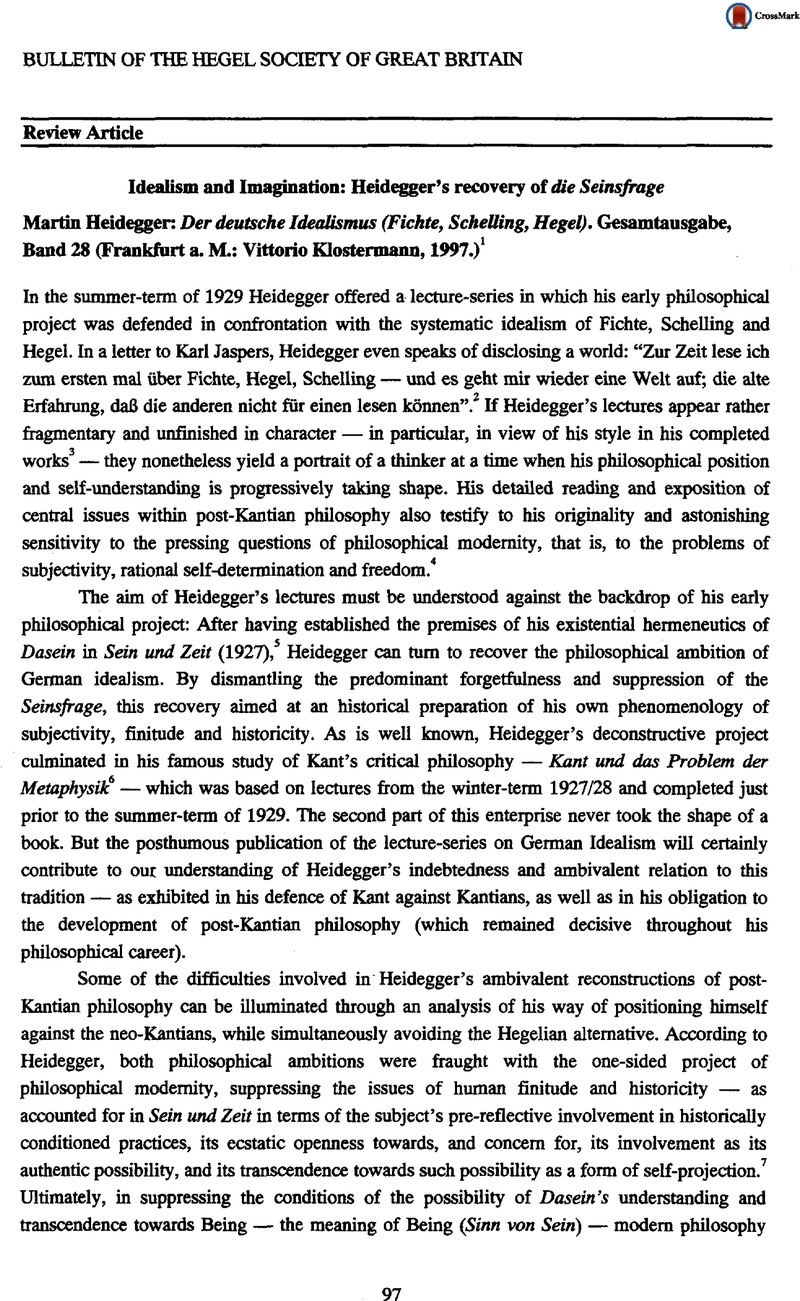No CrossRef data available.
Article contents
Idealism and Imagination: Heidegger's recovery of die Seinsfrage
Review products
Published online by Cambridge University Press: 23 June 2015
Abstract

- Type
- Review Article
- Information
- Bulletin of the Hegel Society of Great Britain , Volume 20 , Issue 1-2: number 39/40 , 1999 , pp. 97 - 107
- Copyright
- Copyright © The Hegel Society of Great Britain 1999
References
1 Herafter cited as DI.
2 Quoted by Claidius Strube in his afterword to Heidegger's lectures, p. 366.
3 In addition to Heidegger's own notes, the editors have had access to fairly accurate transcriptions by students such as Herbert Marcuse.
4 Heidegger's relation to philosophical modernity as normative standard or project is discussed extensively by Pippin, Robert B. in his Idealism as Modernism (Cambridge: Cambridge University Press, 1997), pp. 375ffCrossRefGoogle Scholar.
5 Heidegger, Martin, Sein und Zeit (1927). (Tübingen: Max Niemeyer Verlag, 1986)Google Scholar. Cited as SZ.
6 Heidegger, Martin, Kant und das Problem der Metaphysik (Tübingen: Max Niemeyer Verlag, 1991)Google Scholar. Cited as KM.
7 The following formulation early on in Sein und Zeit captures the project in nuce: “Sein ist das transcendens schlechthin. Die Transzendenz des Seins des Daseins ist eine ausgezeichnete, sofern in ihr die Möglichkeit und Notwendigkeit der radikalsten Individuation liegt” (SZ, p. 38).
8 For a more extensive commentary, see Pöggeler, Otto, Heidegger's Path of Thinking. (Atlantic Highlands: Humanities Press International, 1990), pp. 62ff.Google Scholar
9 Kant, Immanuel, Kritik der reinen Vernunft (1781) (Hamburg: Felix Meiner Verlag, 1990)Google Scholar. English translation by Smith, Norman Kemp, Critique of Pure Reason. London: Macmillan, 1990)Google Scholar. Cited as KrV.
10 As according to Herman Mörchen (one of Heidegger's students), Kant underplays the autonomous role of imagination by making it into “eine bloße Funktion des Verstandes”. Die Einbildungskraft bei Kant (Tübingen: Max Niemeyer Verlag, 1970), p. 75 Google Scholar.
11 This “pragmatist” analaysis was carried through in the first part of Sein und Zeit covering sections §§ 14- 44, and provided the horizon allowing for the Seinsfrage to be addressed in terms of historicity.
12 Presented as a reading of Kant, Heidegger's account has been criticized for disregarding Kant's own comments on the “common root”, namely, that it is something in principle unavailable to reconstructive analysis. See Henrich, Dieter, “On the Unity of Subjectivity” in his The Unity of Reason, ed. Velkley, Richard L., (London: Harvard University Press, 1994), pp. 17–54 Google Scholar.
13 For an account of the normative implications of the principle of self-consciousness within German Idealism, see Horstmann, Rolf-Peter, Die Grenzen der Vernunft (Frankfurt a. M.: Verlag Anton Hain, 1991)Google Scholar.
14 Johann Gottlieb Fichte: Grundlage der gesamten Wissenschaftslehre (1794). In Fichtes Werke I. (Berlin: Walther de Gruyter, 1971)Google Scholar. Cited as WL.
15 For a discussion of Fichte's theory of subjectivity in relation to Kant, see Neuhouser, Frederick: Fichte's Theory of Subjectivity. (Cambridge: Cambridge University Press, 1990)CrossRefGoogle Scholar, chapters 1 and 2. See also my review of Neuhouser in Philosophical Studies 3, 2 (1995): 322–37Google Scholar.
16 The accomplishments of conceptual consciousness, then, are deterrnined and sanctioned by a self-positing subjectivity which is practically engaged in relations of mutual recognition. This crucial point, of which the details cannot be discussed here, have far-reaching consequences for the Idealist account of experience and conceptual consciousness: Much in line with the later Wittgenstein, Fichte acknowledges that the recourse to the activity of self-positing subjectivity will remain incapable of providing a basis for an account of normatively sanctioned conceptual discriminations, since the mere reference to self-positing activity — the arbitrary wilfulness of a subject — will only serve to withraw all object-reference in its insistence upon the purely “inner” way in which conceptual practices are sanctioned. Hence, as Fichte saw, the discriminations of thought must be conceived as conditioned, supported and sanctioned by mutually recognized intersubjective, that is, public criteria and conventions, and, thus, achieved as such only in, say, communicative terms. For an account of this issue (with relevance for Fichte) in view of Wittgenstein's critique of the “inner”, see Eldridge, Richard: “The Normal and the Normative: Wittgenstein's Legacy, Kripke, and Cavell”, Philosophy and Phenomenological Research XLVI, 4 (1986): 555–75CrossRefGoogle Scholar.
17 Fichte, Johann Gottlieb, Grundlage des Naturrechts (1796) (Hamburg: Felix Meiner Verlag, 1991)Google Scholar. Cited as GR.
18 For an account of Fichte's theory of legal recognition, see Siep, Ludwig, Anerkennung als Prinzip der Praktischen Philosophie (Freiburg: Verlag Karl Alber, 1979), pp. 26ffGoogle Scholar.
19 A more elaborate formulation of this point would benefit from a dialogue with the views on the conceptual space of justification presented by McDowell, John, Mind and World (London: Harvard University Press, 1994)Google Scholar. In keeping with this position, conceptual meaning is instrinsically dependent upon the justificatory relevance of particulars as disclosed within practices of justification.
20 in the second division of Sein und Zeit, Heidegger depicts Dasein's authentic decision to take on its finitude as follows: “Die ergriffene Endlichkeit der Existenz reißt aus der endlosen Mannigfaltigkeit der sich anbietenden nächsten Möglichkeiten des Behagens … zurück und bringt das Dasein in die Einfachkeit seines Schicksals” (SZ, p. 384).
21 This overcoming is, for Heidegger, the end of history, which (according to Michel Haar) is to be understood not as “a recommencement, but [as] a totally different, unprecedented, absolutely new commencement”. The Song of the Earth (Indianapolis: Indiana University Press, 1993), p. 68 Google Scholar.




